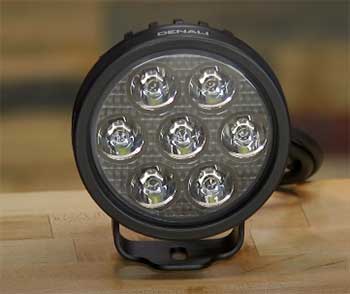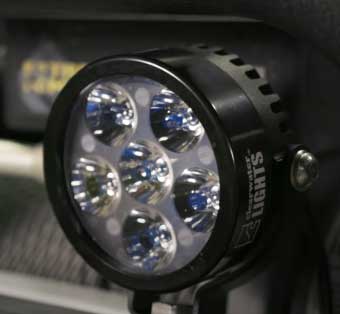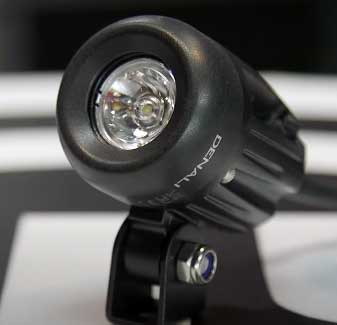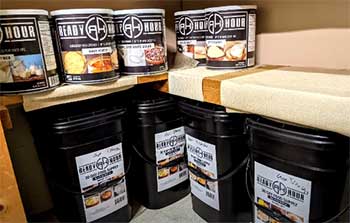If you’re an off-roading enthusiast, upgrading your rig’s lighting should be high on your priority list. With stock halogens, it’s tough to see very far ahead on those dark trails. LED light bars and pods can completely transform your field of vision and allow you to drive more safely and quickly at night.
Two of the most popular LED light brands amongst off-roaders are Clearwater and Denali. But which one offers the best blend of performance, quality, and value? Let’s take an in-depth look at how these two manufacturers stack up.
A Brief Comparison Table
| Aspects | Clearwater | Denali |
| Pricing | Budget-friendly | Premium |
| Light Output | Bright, competitive lumens | Very bright, high raw lumens |
| Beam Patterns | Spot, flood, hybrid optonss | Spot, flood |
| Build Quality | Good, aluminum housing | Excellent, milled aluminum |
| Waterproof Rating | IP67 | IP69K |
| Warranty | 2-5 years | Lifetime |
| Wiring | Plug-and-play | Traditional leads |
| Brackets | Included | Sold separately |
| Styling | Understated | Aggressive, bold |
| Customer Service | Very good | Excellent reputation |
| Made In | Arizona, USA | Idaho, USA |
Overview of Clearwater Lights

Clearwater Lighting is a relative newcomer, founded in 2014 in Arizona. But they’ve quickly made a name for themselves by offering affordable LED lights that don’t compromise on quality. Clearwater manufactures LED light bars, pods, ditch lights, reverse lights, and more.
Some key things to know about Clearwater:
- American-made. Clearwater designs, engineers, and assembles all their lights in Arizona using globally sourced materials.
- Broad product range. They offer LED lights to fit any budget and application. From small 6″ pods to massive 40″ curved light bars.
- Innovative designs. Clearwater has patented a few unique designs like the “Chroma” hybrid spot/flood beam pattern.
- Solid warranty. Most Clearwater lights are backed by a 5-year warranty. Some budget-friendly options have a 2-year warranty.
- Great value. Prices range from around $50 up to $700+ for the high-end light bars. But most models deliver impressive performance for the money.
Overview of Denali Lights
The Denali name has been around since the early days of auxiliary LED lighting in the 1990s. Based in Idaho, they focus heavily on high-end lights but also offer some lower-cost options. Denali produces a wide assortment of LED and HID lights.

Here are some key facts about Denali Lighting:
- Very wide selection. Denali has one of the largest off-road lighting catalogs out there. Bars, pods, cubes, strips, reverse lights, you name it.
- Top-notch performance. With high-quality CREE LEDs and excellent optics, Denali lights shine very far and bright. But the output is precision-focused where you need it.
- Leading warranty. Most Denali LED lights are backed by a lifetime warranty against defects in materials and workmanship. Shows the confidence they have in their lights.
- Premium pricing. There’s no doubt you’re paying more for the Denali name. Prices range from $150 up to $1500+ for the monster-sized light bars. Significant investment for the serious off-roader.
Now let’s do a detailed comparison between Clearwater and Denali across some important factors.
Also Read: Differences Between Black Oak And Baja Designs LED Lights.
Light Output Comparison
When evaluating auxiliary lights, arguably the most important consideration is overall light output. How much illumination are you getting out of the LEDs? And at what distance?
In this area, Denali and Clearwater are fairly evenly matched. Both utilize premium CREE LEDs in their light bars and pods. The intensity and distance are among the industry leaders. Here are some lumens comparisons:
- A 52″ Denali Light Bar produces around 32,000 raw lumens. A Clearwater Platinum 52″ bar produces 28,000 lumens. Very comparable output.
- For smaller LED pods, take the 4″ versions. Denali produces 1,600 lumens per pod. Clearwater isn’t far behind with their 1,200 lumen 4″pods.
- With the spot beam pattern, both brands advertise 800+ meters of distance. The flood pattern lights up a wider area at about 300 meters.
Beam pattern and optics are very similar too. The focused spot throws farther, while the flood has a wider spread. Clearwater does have some unique hybrid spot/flood options not found with Denali. But for pure output, it’s very close between the two manufacturers.
Build Quality Comparison
How rugged are they built? Can the lights handle off-road abuse? Build quality is where Denali starts to justify its premium pricing over Clearwater.
Here are some durability advantages of Denali:

- Housings milled from solid aluminum billets. More resistant to vibration, stress, and corrosion. Clearwater uses aluminum housings as well, but not milled.
- Rubber isolators around the perimeter of light bars. This allows some shock absorption and protects the LEDs. An important feature not found on Clearwater bars.
- Higher waterproof rating of IP69K versus IP67 for Clearwater. Denali lights are completely sealed against dust and can handle high-pressure spray.
- Backed by lifetime warranties versus 2-5 years with Clearwater. Shows Denali is willing to stand behind their lights for the long haul.
That said, Clearwater lights aren’t poorly built by any means.
They should hold up fine to normal off-road use with their aluminum housings and polycarbonate lenses.
Overall, Denali just seems to build their LED lights to tighter tolerances and has more protective features.
Also Read: Comparison of Baja Designs And Heretic Studios LED Lights.
Ease of Installation
One area where Clearwater excels is with straightforward installations. For their LED light bars, they utilize a “plug-and-play” system with quick-connect wiring harnesses. This makes wiring super easy, even for beginners. Most lights are ready to bolt on and go right out of the box.
Denali uses more traditional wiring with separate leads coming off their lights. So you’ll need to do some splicing and stripping during installation. This allows for more placement flexibility, but overall Clearwater’s plug-and-play setup is preferable for most users.
When it comes to mounting brackets, both companies again take different approaches. Clearwater includes basic but sturdy brackets with each light. Denali sells most lights “bracketless” and you need to purchase the mounting hardware separately.
This adds to the total cost but allows you to choose exactly the right bracket for your specific application and location.
Styling Comparison
This category comes down to personal taste, but many off-roaders choose auxiliary lighting as much for the looks as the added illumination. Denali is known for more bold, aggressive styling compared to Clearwater’s low-key designs.

Some examples of the styling differences:
- Denali light bars feature integrated metal grill guards around the perimeter. Clearwater relies instead on external metal shrouds for protection.
- Denali has flashy chrome reflector bezels on some models. Clearwater reflectors are matte black.
- Denali LED pods have finned aluminum “heat sinks” that look cool. Clearwater pods are more basic cylinders.
If you want lights that make a statement, Denali is likely the better choice.
But Clearwater’s pared-down styling allows their lights to blend in more subtly on a vehicle.
This could be preferable for certain builds and personal preferences.
Cost Comparison
As mentioned previously, be prepared to pay a premium price for Denali lights. Here are some examples comparing MSRP pricing of comparable models:
- A 50″ Denali light bar costs around $1,300. For a Clearwater Platinum 52″ bar, expect to pay about $650. Less than half the price.
- A set of two 5″ pods retails for $340 from Denali but only $160 from Clearwater. Again, about half the price.
- Even smaller lights like the 4” pods have a big price gap. Denali 4” pods cost $165 each. Clearwater’s are only $80 each.
Now Denali fans would argue the lifetime warranty and top-tier performance justify spending more upfront. But dollar for dollar, Clearwater delivers excellent value, especially if on a tight budget. Going with a respected brand like Clearwater can still get you great lighting without breaking the bank.
Customer Service Comparison
Before making any major purchase, it’s always wise to consider the level of customer service and support you’ll receive in case any issues pop up down the road. Here’s how Denali and Clearwater compare:
- Denali has earned a reputation for excellent customer service over decades in the industry. Their Idaho-based support team is very responsive if you ever need to make a warranty claim or need help troubleshooting.
- As a newer company, Clearwater is less proven long-term. But so far, customer reviews praise their support for being helpful and quick to resolve problems. Their Arizona facility now has dedicated customer service agents to field inquiries.
- Denali’s lifetime warranty on LEDs sets the gold standard. You can truly “set it and forget it” over years of use. Clearwater has steadily increased its warranty periods, now at 5 years for most LED lights. Not quite lifetime coverage, but strong coverage nonetheless.
- Documentation is excellent from both brands, with detailed installation/user guides and specification sheets available online. Important for proper care and use.
When buying premium off-road lighting, having reliable support for years to come is valuable. Denali’s decades in business and stellar reputation provide added peace of mind, but Clearwater appears to be on the right track building customer confidence and trust. Reach out to either company directly with any concerns prior to purchasing.
Also Read: Comparison of Diode Dynamics And Rigid LED Lights.
Frequently Asked Questions (FAQ)
Denali lights are designed, engineered, and hand-assembled at the company’s main facility in Idaho Falls, Idaho. They source certain materials like LEDs and lenses from trusted global suppliers but do all production in the USA.
Clearwater uses aircraft-grade 6061 T6 aluminum for their light housings and mounting brackets. The lenses are made from polycarbonate or “Lexan” which is very durable and impact/scratch-resistant. Wiring and connectors use premium tinned marine-grade copper. High-quality materials are used throughout.
The Denali S4 and D4 are both LED light pod models. The “S” stands for spot beam pattern while the “D” is a flood/diffused beam. So the S4 would be used when you need to see farther and the D4 for a wider spread of light. Size, housing, wiring are otherwise the same for these 4″ round pods. Choose according to your specific lighting needs.
The Verdict
When comparing Clearwater and Denali LED lighting, there’s no universally “best” brand. Denali offers top-of-the-line performance and quality, but you’ll pay dearly for the privilege. Clearwater delivers excellent illumination and durability at a more affordable price point.
For most casual off-roaders, we think Clearwater provides the better blend of value and functionality. Their unique plug-and-play wiring, versatile beam patterns, and competitive lumen output make Clearwater a compelling choice to upgrade your vehicle’s lighting performance safely.
But for hardcore off-road enthusiasts who compete in races like the Baja 1000 or King of the Hammers, investing in Denali’s uncompromising quality and power can be worthwhile. There’s a reason you’ll see Denali bars on trophy trucks and rock crawlers conquering the toughest terrain.
Whichever brand you choose, transforming your nighttime off-road driving experience with LED light bars and pods is one of the best upgrades you can make. Just don’t cheap out on no-name eBay specials – stick with a proven brand like Clearwater or Denali.
Your retinas will thank you on those pitch-black trails!
Questions?
Let us know if you need any clarification or have additional questions about Clearwater and Denali auxiliary LED lighting options. We’re happy to provide more details to help you choose the perfect lights for how and where you drive.
Safe travels and bright lights!

